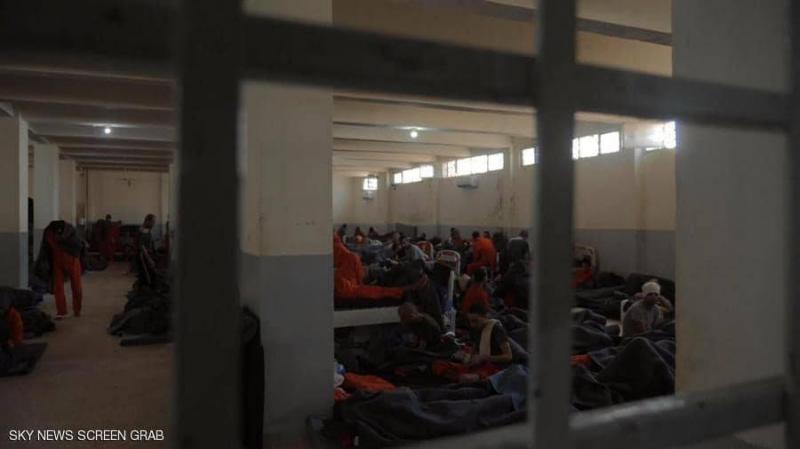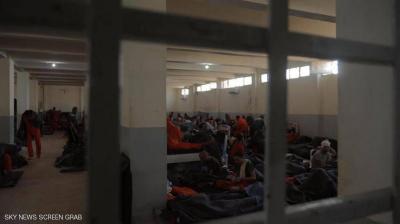Under the title "With American Pressure... The Return of 'ISIS Fighters' Threatens Europe," Sky News Arabia reported on how calls from the U.S. and Europe to repatriate foreign fighters associated with terrorist organizations in Syria and Iraq have prompted varying expert opinions regarding the potential scenarios for European countries' acceptance or rejection of these calls, and what the best scenario might be.
On Friday, the Council of Europe’s Human Rights Commissioner, Dunja Mijatović, urged member countries to allow their citizens detained in Syria for joining ISIS to return to their homes. She highlighted the responsibility of the 47 countries toward their nationals who fought for ISIS and are still in Syria and Iraq, emphasizing that this matter falls under the jurisdiction of those nations. This call followed remarks by U.S. Secretary of State Antony Blinken about the necessity for European countries to repatriate their citizens who fought for ISIS, rehabilitate them, and even prosecute them.
**Acceptance or Rejection**
In separate statements to Sky News Arabia, experts expressed diverse views on European countries' stances regarding the reception of returning ISIS fighters and potential scenarios. Hussein Khidr, Vice President of the Federal Migration Council in Germany’s Social Democratic Party, stated that Europe, led by Germany, has a strong desire to repatriate its fighters through the United Nations and the European Union, mentioning a gradual return of foreign fighters via specialized programs from the ministries of Interior and Justice, with assistance from humanitarian organizations to monitor returnees from Syria, Iraq, and Libya.
Khidr explained that rehabilitation programs are divided into two categories based on the nature of the returnee. In cases of committing a terrorist crime, they would be detained and rehabilitated within prisons according to German law, while those with no criminal record, such as children, would undergo psychological rehabilitation prior to reintegration into society.
Conversely, Albert Farhat, an expert on terrorist groups, disagreed with the previous statement, saying: "Europe is divided on its stance regarding the return of fighters to their home countries; France, Belgium, Britain, and Germany outright reject their return, insisting that the governments of those countries study each case individually to make appropriate decisions." He noted that France and Belgium had recovered children whose parents died in conflict zones, yet both countries continue to refuse to repatriate children over the age of 12 due to concerns about handling them. Meanwhile, Switzerland has repatriated a small number of ISIS fighters to obtain information about the number present in the region, while the "SDF" in Syria (largely Kurdish forces collaborating with Washington) holds over 24,000 ISIS members, with a significant number being French women and children.
The Council of Europe's Commissioner emphasized the need to prioritize the extraction of all foreign children from camps along with their mothers to ensure their welfare. Families have filed legal actions against France for its refusal to repatriate relatives detained in the Al-Hol camp in Syria, where approximately 10,000 fighters from various nationalities are estimated to be held, including around 80 French women and 200 children, following France’s recovery of 35 children without their families aged under 10 years. In 2019, Belgian authorities revoked the citizenship of 13 individuals due to their affiliation with ISIS.
Khidr stated that "revoking citizenship for returnees applies to dual nationals confirmed to have participated in terrorist activities; however, withdrawing it from single-nation holders constitutes a violation of international law."
**Return Scenarios**
Mujahid Al-Sameedai, a security affairs researcher, indicated four potential scenarios for addressing foreign fighters. The first scenario involves forming an international tribunal within the territories controlled by the "SDF," but he predicts the SDF's incapacity to enforce rulings, especially since the past periods have seen fighters escaping from prisons.
He added: "The second scenario involves transferring trials to Iraq, as was the case with some French fighters who were sentenced to death under Iraqi law, which criminalizes affiliation with terrorist organizations with the death penalty. However, this scenario poses significant material and security risks to Iraq, which is currently rejecting it."
Al-Sameedai views the third scenario—repatriating fighters to their home countries for trial—as a challenge due to insufficient evidence to convict them of terrorism, resulting in light sentences ranging from two to four years, allowing these fighters to reintegrate into society and potentially target civilians in terrorist operations.
He continued: "At the same time, European societies refuse to accept fighters and reintegrate them, complicating the execution of the third scenario due to both community and political rejection," warning of a highly dangerous fourth scenario concerning fighters escaping and returning to their countries illegally, transforming into sleeper cells that threaten European security.
Last year, France repatriated 10 children from Syrian camps, Belgium brought back 3 widows of ISIS fighters and 6 of their children, while the Finnish and German governments reclaimed 5 women and 18 children, according to the International Center for the Study of Radicalization at King’s College London.
**American Pressure**
In contrast, Khidr considers the delays in repatriating fighters hazardous as they foster the emergence of new generations of terrorists, praising the American stance towards curbing the phenomenon of lone wolves and terrorist operations.
Al-Sameedai noted that the presence of fighters in conflict regions against ISIS may lead to their escape or return to fighting, especially since the geographical nature in Syria and Iraq allows for hiding, constituting a security breach and a clear threat to the international coalition's efforts against ISIS.
He added: "The U.S. is pressuring the repatriation of ISIS fighters to prevent groups from fleeing to areas outside the coalition's control, such as West and Central African countries like Nigeria and Mali, and North African countries like Tunisia and Libya."
Farhat perceives the U.S.'s aim in pressuring foreign fighters as a means to embarrass European countries and place them before their responsibilities, predicting that Europe will resolve the issue by the end of this year by sending judges to prosecute their nationals in detention facilities.
In August, the U.S. exercised its veto in the United Nations Security Council against a draft resolution concerning the fate of foreign fighters, opposing its lack of a clause calling for their repatriation to their countries.




